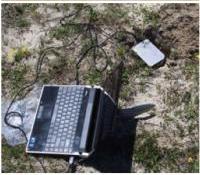Jan 29 2011
A student team belonging to the USC Viterbi School of Engineering was awarded a prize for the Best Paper at the IEEE Homeland Security Conference that was held in November 2010, for a perimeter protection system that they created.
The team is now all set to put it into use at an airport in Florida. Meanwhile, the Transportation Security Administration (TSA) is also planning to use it in its facilities. The team was guided by Alireza Dibazar, an assistant professor of computational neural engineering, and co-director of the USC Laboratory for Neural Dynamics. The paper "Intelligent Acoustic and Vibration Recognition/Alert Systems for Security Breaching Detection, Close Proximity Danger Identification, and Perimeter Protection’ was targeted at the science and technology sector across the world.

The system identifies spatio-temporal sensor patterns of intrusion into boundaries. Intruders could be on foot, jump over the wall or fence, or driving a vehicle. It will safeguard distantly located fenced or virtual perimeters against potential trespassers or terror attacks. It s ideally suited for airports and other transport departments.
It identifies sounds made by intruders. It can ignore a normal passenger and visitor sounds at an airport, but alerts the management if security is breached or anyone tries to climb over a fence at a location away from the landing and visitor area. It will also ignore the movement of jets but ground sensors placed strategically along the runway will detect footsteps or presence of unauthorized vehicles. The sensors can also take pictures at the location of the intrusion to identify the actual culprit.
According to Dibazar, the Dallas Fort Worth airport and Randolph Air Force Base in San Antonio also plan to test the system at their facilities.